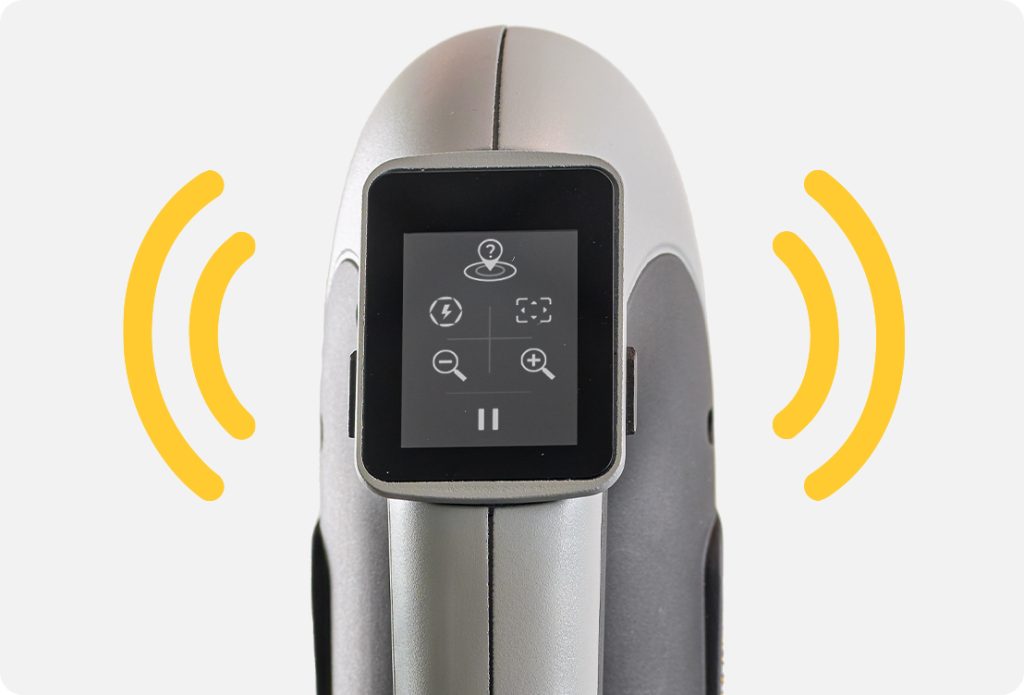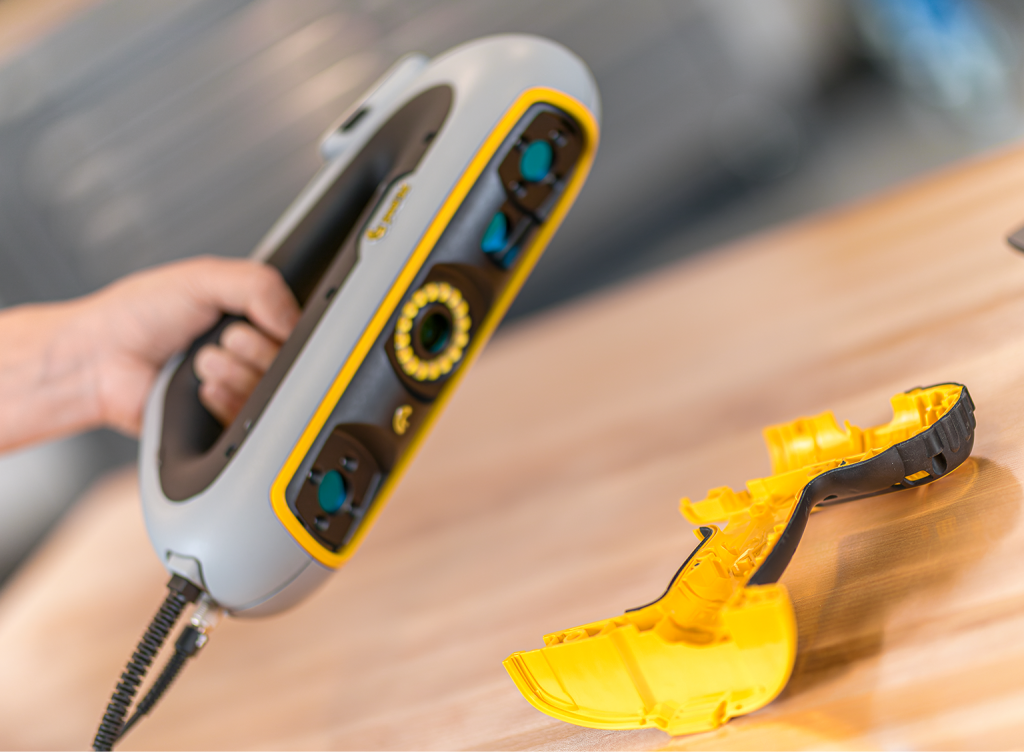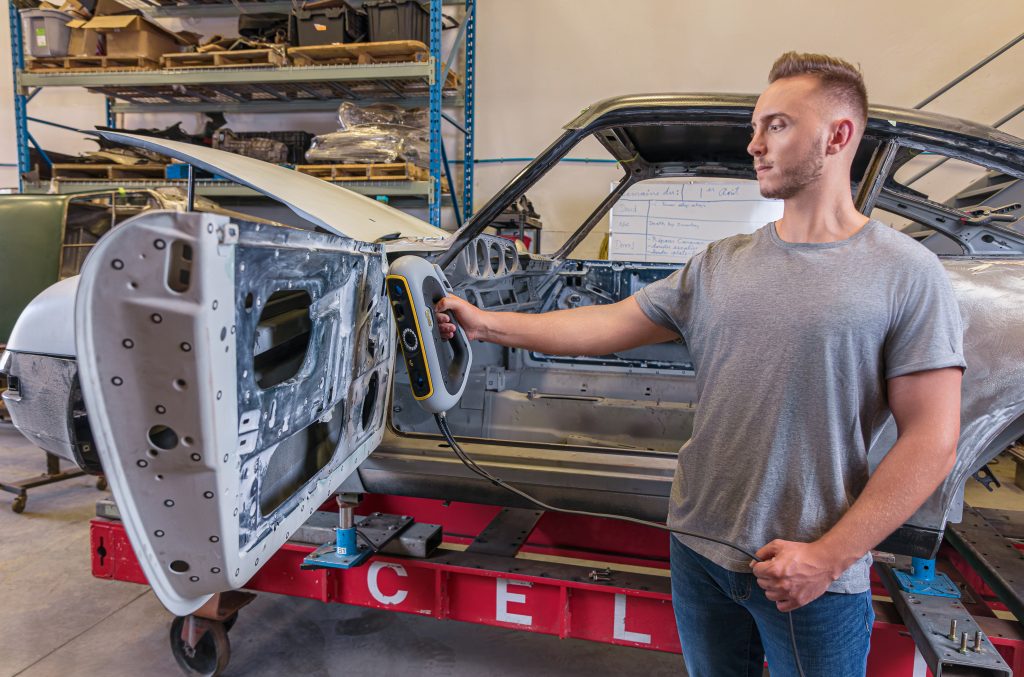3D scanner manufacturer peel 3d has announced the launch of two new products, the peel 3 and peel 3.CAD.
Designed to elevate users’ experiences without compromising on affordability, both new scanners feature a revamped ergonomic design, as well as improved resolution and performance. These upgrades, in tandem with the devices’ industry-first haptic feedback system, allow adopters to generate high-quality models of complex objects regardless of their scanning skill level.
“In addition to the boosted performance specs and innovative design of the new peel 3 3D scanners, the fact that each can be supported with integrated and powerful scan-to-CAD software is something the market has never seen before for this category of 3D measurement solution,” explained peel 3d Program Manager, François Leclerc. “This clearly shows our commitment to democratizing the entire 3D scanning experience for users in many fields.”

peel 3d and ergonomic scanning
Working from its Canadian HQ, peel 3d has steadily accrued a 3D scanning portfolio capable of meeting the needs of both tinkerers, and engineers targeting industrial use cases. That said, while similarly built to be affordable and meet North American durability, reliability and accuracy standards, the firm’s peel 3d scanner and its peel 2 successors pack differing feature sets.
Based on scanning technology developed by AMETEK subsidiary Creaform, peel 3d launched the original peel in 2017, with a lightweight, minimalist design and suitably stripped-back sub-$6,000 price tag. During the 3D Printing Industry peel 3D scanner review, we found the simple but effective tool was easy-to-set up, quick to calibrate and capable of rapidly capturing objects.
With its follow-up scanners, the peel 2, peel 2-S and peel 2 CAD-S the firm has kept the price point similarly low, while fitting them with upgrades to make them more suited to capturing smaller parts. Thanks to their improved tracking color capturing and geometric capabilities, these scanners were better able to meet the precision needs of artists, designers and engineers.

Introducing peel’s third-gen scanners
With its latest devices, peel 3d has stuck to tradition, in that they’re built to offer professional-grade 3D scanning capabilities at an accessible price. Both packages include the new peel 3 handset, the main difference between them being that the peel 3.CAD comes with a dedicated reverse engineering software.
When it comes to the peel 3, the headline addition to the device is the integration of haptic feedback. In practice, this technology enables the scanner to continually emit distinctive vibration patterns as users scan narrow and hard-to-reach areas of objects without a direct line-of-sight, helping them maximize accuracy.
In the spirit of accessibility, the company’s newest scanner also features a revamped ergonomic handle, with a triangulated grip designed to make it comfortable to use in common scanning positions, as well as an in-built touchscreen, that adopters can use as a distance meter to scan without having to look at their computer.
Whether customers choose to buy the peel 3 or 3.CAD iteration, they both ship with peel.OS, a software developed to allow users to transform scans into 3D printable CAD-ready files. According to peel 3d, the easy-to-use data acquisition program lets users easily “process, clean, align, improve and export” 3D models.
Combined, the company says these features allow its new peel 3 scanning packages to address a variety of use cases, ranging from AR, VR and digital content creation, to automotive, product design, healthcare, maintenance repair and overhaul (MRO), engineering, education and heritage preservation.
“peel 3 and peel 3.CAD are the culmination of feedback from our customers as well as the market needs we have observed over the past months,” added Leclerc. “The entire team at peel 3d believes that 3D scanning users, whether beginners or seasoned pros, should never have to compromise performance for price. Today’s launch is proof of the value we bring to the table.”

Technical specifications and pricing
Below are the technical specifications for peel 3d’s peel 3 and peel 3.CAD 3D scanners. Those interested in buying the devices, can order the peel 3 or peel 3.CAD now via the company’s online store, with pricing starting at $8,490 and $11,990 respectively.
Alongside the peel 3, the company has also launched a series of accessories such as cables and carry kits designed to compliment it, in addition to ‘V.I.peel,’ an exclusive white-glove service and investment protection program that includes free software updates, extended hardware repair coverage and more.
| Projector Light Source | IR VCSEL |
| Reccomended Object Size | 0.1 – 3.0 m |
| Accuracy | 0.250 mm/m, up to 0.1 mm |
| Measurement Resolution | 0.250 mm |
| Scan Speed | 80 sec/m2 |
| Distance From Object | 250 to 550 mm |
| Color Resolution | 250 DPI |
| Dimensions | 304 x 150 x 79 mm |
| Weight | 950 g |
| Connectivity | USB 3.0 |
To stay up to date with the latest 3D printing news, don’t forget to subscribe to the 3D Printing Industry newsletter or follow us on Twitter or liking our page on Facebook.
While you’re here, why not subscribe to our Youtube channel? featuring discussion, debriefs, video shorts and webinar replays.
Are you looking for a job in the additive manufacturing industry? Visit 3D Printing Jobs for a selection of roles in the industry.
Featured image shows a diagram depicting the haptic feedback features of the peel 3 3D scanner. Image via peel 3d.



